
Arianism is a Christological doctrine first attributed to Arius, a Christian presbyter from Alexandria, Egypt. Arian theology holds that Jesus Christ is the Son of God, who was begotten by God the Father with the difference that the Son of God did not always exist but was begotten within time by God the Father, therefore Jesus was not co-eternal with God the Father.

Adoptionism, also called dynamic monarchianism, is an early Christian nontrinitarian theological doctrine, which holds that Jesus was adopted as the Son of God at his baptism, his resurrection, or his ascension.

In Christianity, Christology, translated literally from Greek as "the study of Christ", is a branch of theology that concerns Jesus. Different denominations have different opinions on questions like whether Jesus was human, divine, or both, and as a messiah what his role would be in the freeing of the Jewish people from foreign rulers or in the prophesied Kingdom of God, and in the salvation from what would otherwise be the consequences of sin.
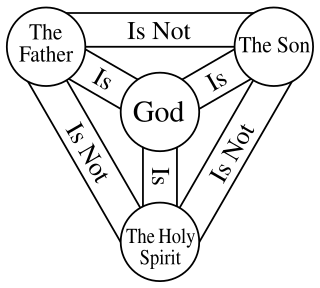
The Christian doctrine of the Trinity defines one God existing in three coequal, coeternal, consubstantial divine persons: God the Father, God the Son and God the Holy Spirit, three distinct persons sharing one homoousion (essence). As the Fourth Lateran Council declared, "it is the Father who begets, the Son who is begotten, and the Holy Spirit who brings about." In this context, the three persons define who God is, while the one essence defines what God is. This expresses at the same time their distinction and their indissoluble unity. Thus the whole work of creation and grace is seen as a single common operation of all three divine persons, in which each manifests what is proper to it in the Trinity, so that all things are "from the Father," "through the Son," and "in the Holy Spirit."

Nontrinitarianism is a form of Christianity that rejects the mainstream Christian doctrine of the Trinity—the belief that God is three distinct hypostases or persons who are coeternal, coequal, and indivisibly united in one being, or essence. Certain religious groups that emerged during the Protestant Reformation have historically been known as antitrinitarian.

The following outline is provided as an overview of and topical guide to Christian theology:
Christocentric is a doctrinal term within Christianity, describing theological positions that focus on Jesus Christ, the second person of the Christian Trinity, in relation to the Godhead/God the Father (theocentric) or the Holy Spirit (pneumocentric). Christocentric theologies make Christ the central theme about which all other theological positions/doctrines are oriented.
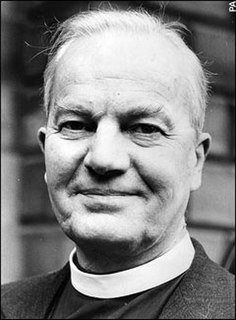
Thomas Forsyth Torrance, commonly referred to as T. F. Torrance, was a Scottish Protestant theologian and minister. Torrance served for 27 years as professor of Christian dogmatics at New College, in the University of Edinburgh. He is best known for his pioneering work in the study of science and theology, but he is equally respected for his work in systematic theology. While he wrote many books and articles advancing his own study of theology, he also edited the translation of several hundred theological writings into English from other languages, including the English translation of the thirteen-volume, six-million-word Church Dogmatics of Swiss theologian Karl Barth, as well as John Calvin's New Testament Commentaries. He was a member of the famed Torrance family of theologians.
Philosophical theology is both a branch and form of theology in which philosophical methods are used in developing or analyzing theological concepts. It therefore includes natural theology as well as philosophical treatments of orthodox and heterodox theology. Philosophical theology is also closely related to the philosophy of religion.
Miaphysitism is the Christological doctrine that holds Jesus, the "Incarnate Word, is fully divine and fully human, in one "nature" (physis)." It is a position generally held by the Oriental Orthodox Churches and differs from the Chalcedonian position that Jesus is one "person" in two "natures", a divine nature and a human nature.

In Christian theology, the imitation of Christ is the practice of following the example of Jesus. In Eastern Christianity, the term life in Christ is sometimes used for the same concept.
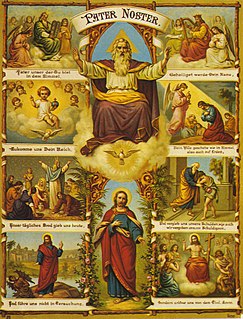
In Christian theology, the incarnation is the belief that Jesus Christ, the second person of the Trinity, also known as God the Son or the Logos, "was made flesh" by being conceived in the womb of a woman, the Virgin Mary, also known as the Theotokos. The doctrine of the incarnation, then, entails that Jesus is fully God and fully human.
Prosopon is a theological term used in Christian theology as designation for the concept of a divine person. The term has a particular significance in Christian Triadology, and also in Christology.
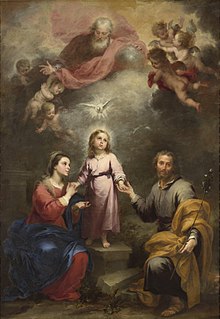
Subordinationalism is a view of the Trinity, where the Son is subordinate to the Father. Subordinationism is defined as hierarchical rankings of the persons of the trinity, implying ontological subordination of the Son and the Holy Spirit.
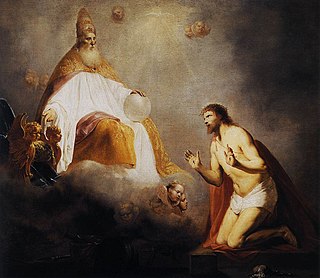
God in Christianity is believed to be the eternal, supreme being who created and preserves all things. Christians believe in a monotheistic conception of God, which is both transcendent and immanent. Christian teachings on the transcendence, immanence, and involvement of God in the world and his love for humanity exclude the belief that God is of the same substance as the created universe but accept that God's divine nature was hypostatically united to human nature in the person of Jesus Christ, in a unique event known as "the Incarnation".
Brian Edward Daley, S.J. is an American Catholic priest, Jesuit, and theologian. He is currently the Catherine F. Huisking Professor of Theology (Emeritus) at the University of Notre Dame and was the recipient of a Ratzinger Prize for Theology in 2012.
The pre-existence of Christ asserts the existence of Christ before his incarnation as Jesus. One of the relevant Bible passages is John 1:1–18 where, in the Trinitarian interpretation, Christ is identified with a pre-existent divine hypostasis called the Logos or Word. There are nontrinitarian views that question the aspect of personal pre-existence or the aspect of divinity or both.
Christian fascism is a term which is used to describe a far-right political ideology that denotes an intersection between fascism and Christianity. It is sometimes referred to as "Christofascism", a neologism which was coined in 1970 by the liberation theologian Dorothee Sölle.

Christian theology is the theology of Christian belief and practice. Such study concentrates primarily upon the texts of the Old Testament and of the New Testament, as well as on Christian tradition. Christian theologians use biblical exegesis, rational analysis and argument. Theologians may undertake the study of Christian theology for a variety of reasons, such as in order to:
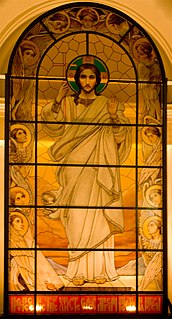
The knowledge of Christ refers to one of two possible, and at times related, topics in Christology: one addresses how Christians come to know Christ, the other focuses on the knowledge of Christ about the world. Discussions regarding the knowledge of Christ have had a central place in Christology for centuries. In the 20th century, the interplay between the two concepts was epitomized in the title of a book by Hans Urs von Balthasar: "Does Jesus Know Us? Do We Know Him?"









